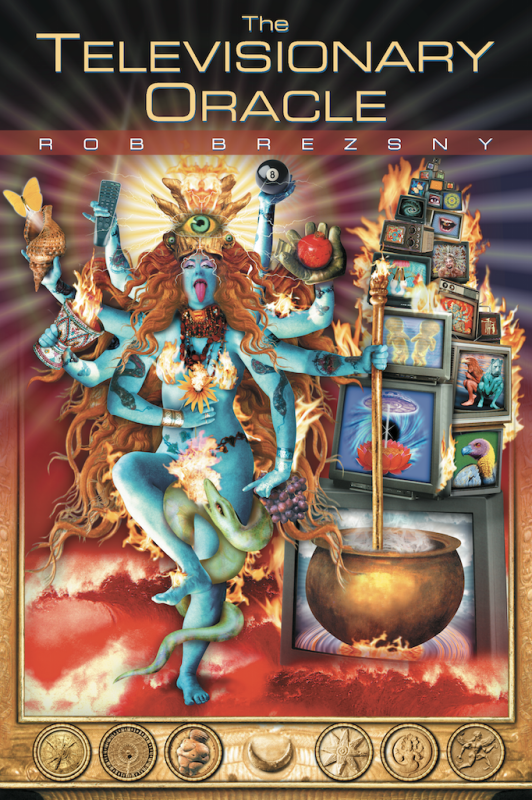Oh My Goddess
Oh My Goddess!
Rob Brezsny's The Televisionary Oracle
By Os Davis in the Weekly Alibi
Visualize an even goofier Tom Robbins or a Douglas Adams turning his world processor's efforts away from outer space into inner space. Imagine a slap-happy Kurt Vonnegut reeking of optimism or a Robert Anton Wilson with a spiritual agenda rather than a paranoia-pushing political one. After adjusting their attitudes accordingly, take all four of these snarky wordsmiths and fuse them together lovingly, tossing in healthy amounts of counter-propaganda and post-New Age mysticism. The end result of this mixture should produce an author that, if not a perfect portrait of Rob Brezsny, bears more than a passing resemblance to everyone's favorite alternative astrologer.
The Televisionary Oracle is stargazer and freelance philosopher Brezsny's first full-length work of "fiction" (and his first tome of any sort in 15 years), a corpulent novel telling of Mary Magdalene's reincarnation and subsequent schooling at the Menstrual Temple of the Funky Grail so that she might "kill the apocalypse" made inevitable by the "phallocratic" powers that be. Said late 20th century messiah, carrying the moniker of Rapunzel Blavatsky and title of "shamanatrix," ploughs through worlds physical and metaphysical, real and unreal, sane and insane on her way to vision quest. Somewhere in her future lies the inducement of a full-on "Twenty-two Minutes of World Orgasm."
Rapunzel is one of recent literature's sexiest female protagonists, and her voice represents one of three first-person narratives alternating throughout the novel. Equal in narrative status to her tale is a head trip through the world of the Santa Cruz music scene via "Rockstar," an onion skin-thin fictionalization of Brezsny himself. The "macho feminist" and "bullshit artist of the first magnitude-a play acting lunatic [devoted] to creating hyper-real performance art on the spur of the moment" swallows page after page detailing his obscure philosophy regarding women and the nature of rock music itself all the while hoping to enlighten the masses through the tunes of his band World Entertainment War.
A third stridency comes in the form of the title character, a free-thinking animated product of the universal unconscious created some 66 million years ago by a previous earthly incarnation of Rapunzel. For pertinence to the early 21st century, the Oracle has taken the form of a television in order to spew forth a new doctrine. Interspersed between parallel tales of Rapunzel and Rockstar are neat little sound bites designed to "prevent the global genocide of the imagination" while "Reminding you/that you can have anything you want/if you'll just ask for it in an unselfish tone of voice."
Confused? Hah! Wait until you get to page 41, wherein the world ends with some 440 pages to go. And how exactly do jalapeno popsicles, Carl Jung's theories of alchemy, the Goddess, sea urchins, daffodils, Jesus Christ, CBS Records, a Goodwill truck, Persephone, Cracker Jack boxes, a "genuine native Slovakian-American goofball shaman," and the Holy Grail fit in? That's for you to find out; suffice to say it all fits together with the precision of a Robbinsian riddle. Thoughout, however, characters aplenty remind us that the spaces in between diametric opposites hold all the answers. The state sandwiched within "Dreamtime" and "Daytime"- dubbed the "Drivetime" in The Televisionary Oracle - is a non-space serving as setting for most of the novel's revelations and explanations.
From the first meeting of Rapunzel and Rockstar (on the page, only - for Brezsny, like his post-post-modern ilk, has little tolerance for linear temporality), Brezsny draws in readers with the same turgid-yet-fluid prose that graces his "Free Will Astrology" column. What is on the surface a very show-moving tale - there's not a single murder or violent act in the book, promotional material reminds - races by as the author reaches for another paradigm-spinning juxtaposition; by the time World Entertainment War finally and climactically hits the stage for our benefit, the sucked-in readership should have hardly noticed that 300-plus pages have flown by. And with the dogged persistence of Wilson, Brezsny is content to cram pages worth full of Rapunzel's head trips, hallucinations and divinations while few real actions take place.
"But what is real?" the Free Willer may ask, correctly picking up on Brezsny's sensibilities. Throughout a tome of trippy metaphor and surreal psychology, one very serious point remains. Against institutions lined up to crush the majority of humanity one way or another, the enlightened have a single weapon: imagination. Rapunzel, Rockstar, and Brezsny himself are 100 percent devoted to fighting "the genocide of the imagination." The Televisionary Oracle represents a strong salvo in the war. Delivered with love, of course. (Frog, Ltd., paper, $16.95)


